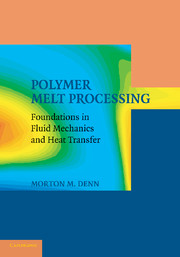Book contents
- Frontmatter
- Contents
- Preface
- 1 Polymer Processing
- 2 Fundamentals
- 3 Extrusion
- 4 Temperature and Pressure Effects in Flow
- 5 The Thin Gap Approximation
- 6 Quasi-Steady Analysis of Mold Filling
- 7 Fiber Spinning
- 8 Numerical Simulation
- 9 Polymer Melt Rheology
- 10 Viscoelasticity in Processing Flows
- 11 Stability and Sensitivity
- 12 Wall Slip and Extrusion Instabilities
- 13 Structured Fluids
- 14 Mixing and Dispersion
- Postface
- Author Index
- Subject Index
- Plate section
- References
1 - Polymer Processing
Published online by Cambridge University Press: 05 June 2012
- Frontmatter
- Contents
- Preface
- 1 Polymer Processing
- 2 Fundamentals
- 3 Extrusion
- 4 Temperature and Pressure Effects in Flow
- 5 The Thin Gap Approximation
- 6 Quasi-Steady Analysis of Mold Filling
- 7 Fiber Spinning
- 8 Numerical Simulation
- 9 Polymer Melt Rheology
- 10 Viscoelasticity in Processing Flows
- 11 Stability and Sensitivity
- 12 Wall Slip and Extrusion Instabilities
- 13 Structured Fluids
- 14 Mixing and Dispersion
- Postface
- Author Index
- Subject Index
- Plate section
- References
Summary
Introduction
Polymeric materials – often called plastics in popular usage – are ubiquitous in modern life. Applications range from film to textile fibers to complex electronic interconnects to structural units in automobiles and airplanes to orthopedic implants. Polymers are giant molecules, consisting of hundreds or thousands of connected monomers, or basic chemical units; a polyethylene molecule, for example, is simply a chain of covalently bonded carbon atoms, each carbon containing two hydrogen atoms to complete the four valence sites. The polyethylene used to manufacture plastic film typically has an average molecular weight (called the number-average molecular weight, denoted Mn) of about 29,000, or about 2,000 –CH2– units, each with a molecular weight of 14. The symbol “–” on each side of the CH2 denotes a single covalent bond with the adjacent carbon atom. (The monomer is actually ethylene, CH2=CH2, where “=” denotes a double bond between the carbons that opens during the polymerization process, and a single “mer” is –CH2–CH2–; hence, the molecular weight of the monomer is 28 and the degree of polymerization is about 1,000.) The ultra-high molecular weight polyethylene used in artificial hips and other prosthetic devices has about 36,000 –CH2– units. Polystyrene is also a chain of covalently bonded carbon atoms, but one hydrogen on every second carbon is replaced with a phenyl (benzene) ring. Two or more monomers might be polymerized together to form a copolymer, appearing on the chain in either a regular or random sequence.
- Type
- Chapter
- Information
- Polymer Melt ProcessingFoundations in Fluid Mechanics and Heat Transfer, pp. 1 - 17Publisher: Cambridge University PressPrint publication year: 2008



